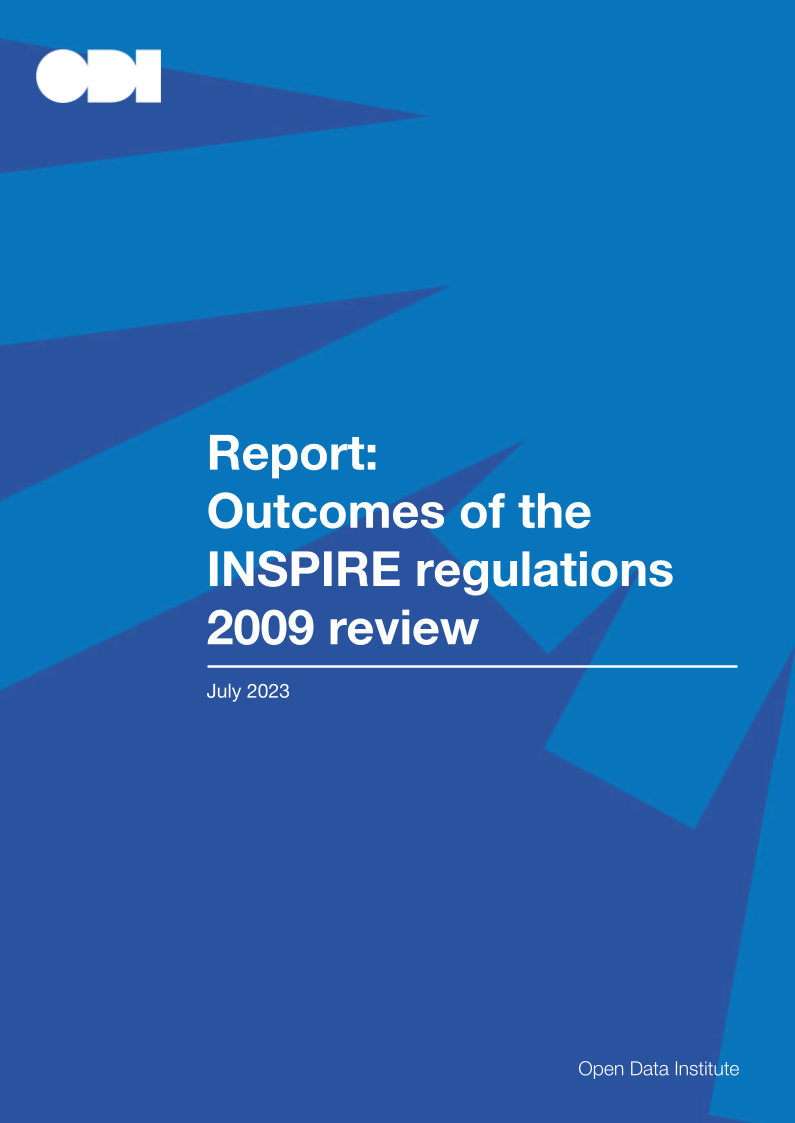
To many in the geospatial world, any mention of INSPIRE may likely elicit groans of frustration, or, at the very least, questions about whether it’s still “a thing”. To those of us that work in data, metadata, and standards, it’s not just “a thing”, but is widely recognised as an “extremely worthwhile thing”. In our esoteric little corner of the internet, we were therefore pleased to see that the Open Data Institute (ODI) has released its review of the INSPIRE Regulations 2009.
The report assesses whether INSPIRE (or should it be the UK Government implementation of INSPIRE?) achieved the technical and policy objectives of creating a national Spatial Data Infrastructure (SDI) and improving the quality and availability of data for environmental policymaking.
Is INSPIRE a success?
We’ll be surprised if anyone will argue against the report’s findings. The report’s authors state, “INSPIRE made relevant data more easily accessible, particularly for non-expert audiences. By providing an interface that did not require technical geospatial expertise and specialist software, INSPIRE made data far more widely accessible.”
From a technical perspective, the initial phase of publishing specific datasets via standardised endpoints and with standardised metadata mostly worked.
However, the second phase of publishing data to standardised schemas was too complicated and time-consuming. It didn’t even get off the ground. As the authors note, “Very few public bodies adopted data specifications, which had been envisaged as a way to achieve interoperability and reusability.”
We also don’t think anyone would argue about the lack of support and engagement in the process. The winding up of the UK Location Program in 2012 and the decreasing political and financial support for data.gov.uk mean that it has become increasingly difficult to find good documentation or help if things go wrong.
The report concludes that technically, the UK INSPIRE implementation was a success, despite itself, as it “drastically accelerated desirable data-publishing behaviours around the findability of data… [and] removed any debate about which metadata standard to use.”
Going back to basics
The picture around its success in achieving policy objectives is not so clear, and to be honest, of less importance to those of us working at the coal face. The authors admit that they had to focus on public sector stakeholders due to time constraints, and it’s clear that the main thrust of the report is on benefits at the policy level and not for the actual creators and users of the data.
At Astun, we do want to focus on the actual creators and users of the data. Providing better tools, support, and guidance will make their job easier and improve the flow of data upwards to the policymakers. We have always gone back to the basics with INSPIRE, rather than discussing it in lofty terms of policies and legislation. INSPIRE is about making sure you can get to the correct data, in a standardised format, quickly and efficiently.
Jo Cook, our Data Discoverability Lead, comments, “Floods and other natural disasters do not care about county boundaries. Nor do they care whether your data is in a shape file or tab file or if you know who to ask to get hold of the data in the first place. Consequently, our focus at Astun has been on the practical benefits of good data-sharing practices rather than meeting the legal requirements.
“Furthermore, we’ve always felt that going through the INSPIRE process gave people a better understanding of how (and where) data was produced within their organisations and helped make that workflow more efficient.”
The impact of search engines
As for today, the report acknowledges that things have progressed somewhat. The way people search for data has changed dramatically over the last decade. The report continues “People tend to use search engines rather than a central metadata repository to find data… [and] INSPIRE data published through DGU is not as ‘findable’ relative to data with SEO-optimised metadata.”
This has been a central tenet of Astun’s work in Data Discoverability for several years now. Our approach has paid off as the Scottish Spatial Data Infrastructure (SSDI) portal, managed by our team on behalf of the Scottish Government, is commended for demonstrating that “combining considerations of SEO with INSPIRE standards can make INSPIRE data easily findable, and help its value to be realised.”
We’ve baked SEO into our implementation of the UK GEMINI metadata standard, so your data will be as Findable, Accessible, Interoperable, and Reusable (FAIR) as possible.
“Traditional” standards for sharing data have also progressed in the intervening years, with a more modern and developer-friendly API-based approach gaining popularity over the established data-sharing standards mandated as part of INSPIRE. The good news is that you don’t need to expend additional resources maintaining extra infrastructure to be both compliant and in with the cool kids. Metadata Catalogs such as GeoNetwork, which the Astun Data Discoverability solution is based on, provide both types of endpoints by default.
The future of INSPIRE
INSPIRE’s future as the basis for a national SDI is unclear. The report goes a long way towards highlighting the benefits and making recommendations for the approach, but it will need government buy-in to go ahead. In the meantime, we’ll focus on the benefits of standards-compliant, FAIR approaches to data sharing, and keep working with the data creators and users to make the whole process as easy as possible.
Find out more
Explore how our services can help you make your data Q-FAIR.
Subscribe to our newsletter for the latest news about data and metadata management.
The ODI report was researched and produced by the Open Data Institute (ODI) in collaboration with Defra and published in July 2023. Its lead author was David Warrell, with supporting contributions from Rachel Wilson and Lisa Allen. You can access the full report on the ODI website.

